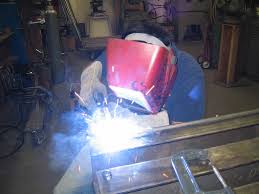Companies in Europe have to set up a system that complies with the rules as described in the “EN 1090 standard - certification for metal producing and processing companies”, which is mandatory from the 1st of July 2014. These rules depend on the type of constructions, the materials used, the type of load and the fabrication complexity of the product.
The standard implementation is generating structural economic changes and industrial productivity growth, requiring a highly skilled and adaptable workforce, allowing companies to face the European economic and social challenges for the early future.
|
SAT-EN 1090 meets the European Employment Strategy (EES) that highlights, the "significant role of vocational education and training in delivering the knowledge based economy" as it aims to tackle an industrial request by developing a harmonized training curriculum related to the EN 1090 application. Furthermore, through the development of said outcome SAT-EN 1090 intends to cover a growing market need for specialised professionals qualified to ensure company’s compliance with EN 1090.
The consortium partners, closely involved with metal industries, have identified that over 75% of companies are not prepared to implement EN-1090, based on their current activities within the sector. Considering that the European metal working sector accounts for over 87€ billion of value added to the European economy, as well as over 2 million jobs a lack of compliance will lead to a severe negative impact across European companies.
| 
|
SAT-EN 1090 gains additional relevance by contributing to the European Union’s and the Erasmus + objectives of boosting cross-border mobility of skilled workers. This will be achieved based on the creation of a European profile, contrasting with existing national qualifications, in accordance with the European Qualification Framework (EQF) requirements for learning outcomes.
The project aims at avoiding unfulfillment of mandatory EN standards by European metal working companies. This will be done by developing an harmonized curriculum for personnel involved in the implementation of the EN 1090 in industry, focusing not only in large enterprises but also in SME's in different European countries. This objective will be achieved through the definition of educational materials for the training of personnel involved in EN 1090 implementation.
|
The aim of this project is to harmonize the training of personnel involved in the management and control of metal fabrication and assembly in the industrial manufacturers on several European countries. This will be achieved through the definition of learning materials for training of personnel involved in the implementation of the EN 1090. This will lead to a harmonization of European companies involved in steel or aluminium manufacturing and the unification in Europe of the methods in order to implement the standard. This harmonization will lead to improve mobility throughout Europe of people in vocational training, initial and continuous. As well as improving the quality of education and training of all types of providers. In the end of this project is is expected to have 4 VET providers ready for starting training in EN1090 implementation. This training is not currently available in the countries involved, making it more complicated for the companies that need to implement EN 1090. Training providers are, currently, not prepared to support companies for complying with the EN 1090. A survey in the EWF network, covering 31 countries, indicated that only 10% of the countries that have VET providers have started preparatory work for training related to the implementation of EN 1090.
| 
|
|













